
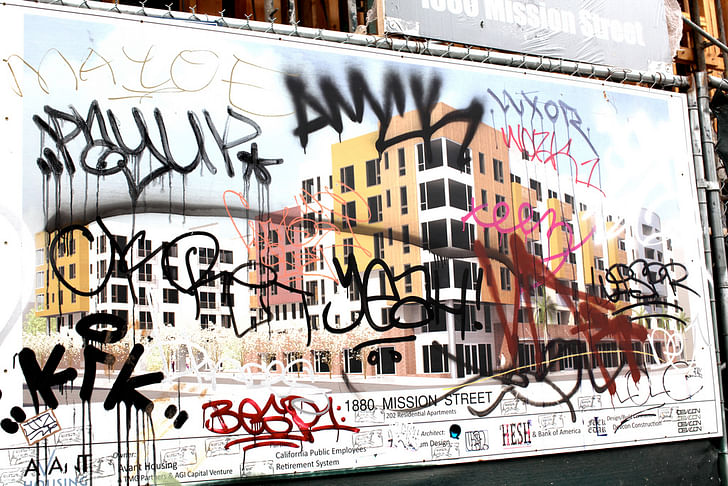
A recent Bay Area transplant sees old and new duke it out over the Bay Area's shifting public-private fault line.
Before I left England to work in the US just over two months ago, the word ‘gentrification’ was not overly familiar to me. Back home, the phenomenon is perhaps most prevalent in East London, where “hipster”-run espresso shops have been encroaching on gloriously seedy quarters of Dalston and Shoreditch in recent years. Besides this, the term was generally confined to urban planning lectures and sociology seminars in Universities around the country.
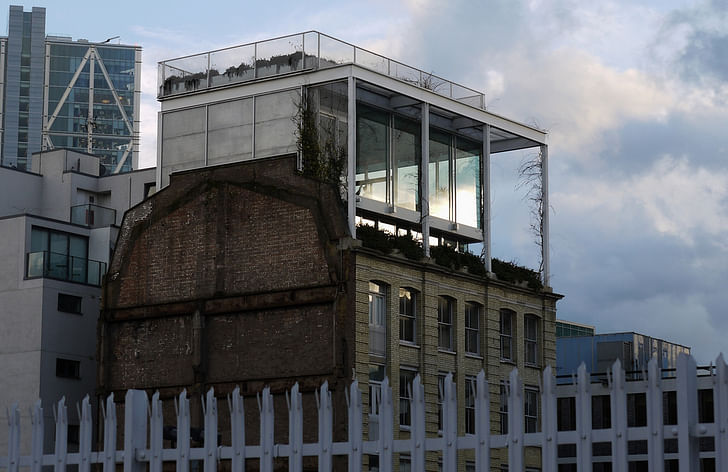
On the contrary, the word appears to be part of the daily lexicon here in San Francisco, and while the process attracts both advocates and detractors, one thing is clear – everyone has a view on it.
The Bay Area’s brand of gentrification is manifested as a slow-moving sociological battle, with a series of flashpoints erupting across the urban frontline over the past couple of years: give or take a few undulations, that frontline can be drawn in a single line up Market Street from the Mission to the Bay. Tensions have been fueled by a well-documented influx of tech companies to the city, with the generous wages, idiosyncratic culture and shifting demographics that come with them.
To get under the skin of the issue, I’ve spent a good deal of time exploring the streets and talking to a plethora of local residents, including business owners in the Mission district, my colleagues on O’Farrell St., Giants fans at AT&T Park, and tech workers in the bars south of Market Street, aka SOMA, where many tech offices are located. Four flashpoints – metaphorical battles within the wider war over gentrification across the Bay Area – came up time and again in these discussions, which encapsulate the polarized views this debate inevitably produces: read on and decide for yourself.
Flashpoint 1: Mission Playground
The staff at Dropbox learned that wearing your company’s logo on your T-shirt can lead to some pretty undesirable and damaging consequences in the face of social media. When they tried to reserve the pitch via an app at Mission Playground but found the space occupied by local youths playing pick-up games, the ensuing argument was captured on video and subsequently went viral. The sight of tech workers waving a reservation permit in the faces of how could this vital public space, celebrated for its universal social inclusivity, be sold by the local authority to a privileged few?defiant locals was emblematic of social conflicts being witnessed across the Mission: how could this vital public space, celebrated for its universal social inclusivity, be sold by the local authority to a privileged few?
The Victors: Locals. In the face of protests at City Hall, the playground’s reservation policy was rescinded, restoring the park as a traditional pick-up soccer destination.
Flashpoint 2: Local’s Corner
Not far from Mission Playground, a restaurant set up by Yaron Milgrom and Jake Des Voignes is due to shut down this month after two years of business: it has been a repeated target of vandalism amid accusations of discrimination by its owners, and the general consensus that naming your restaurant ‘Local’s Corner’ when you aren’t from the neighborhood is contrived at best, and downright arrogant at worst (however, the restaurant is named for its sourcing, not its owners). This being said, the fiasco has fuelled the worst form of NIMBYism on the part of certain (alleged) locals, spray-painting incredibly hateful language across the shop-front on multiple occasions. They argue that the restaurant was incongruous to the area’s culture and demographic, and a simple lack of customers was the real reason for its demise.
The Victors: No-one. The new-comers have been forced out, and what the locals will be left with after their departure remains unclear.
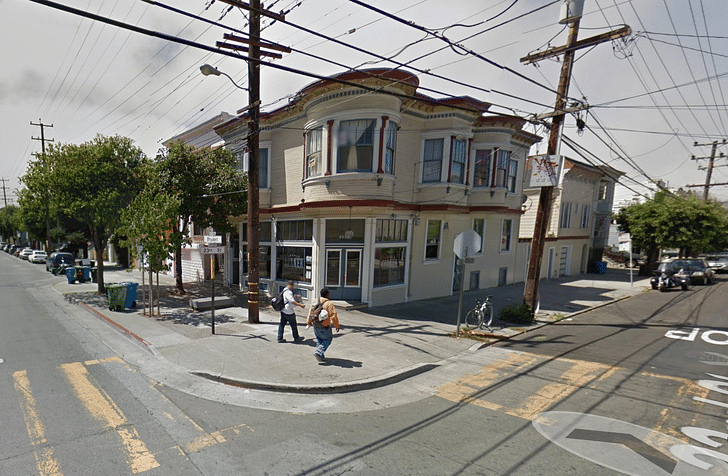
Flashpoint 3: Mid-Market
The plight of homeless and drug-affected populations in San Francisco’s Mid-Market district remains tangible, despite the arrival of one of tech’s big boys: Twitter moved into a gargantuan building fronting Market Street in 2012, tempted in by the low asking price for the Art-Deco landmark and a six-year exemption from payroll tax. Designed to attract businesses and help ‘clean up’ the area, this tax break has been criticized by many locals under pressure from rising rents. Indeed, nearby developers actually altered the specifications of their proposed apartment block when Twitter’s arrival was announced, in the hope of acquiring a windfall from the influx of affluent tech workers.
The Victors: New-comers. Rightly or wrongly, Twitter has secured a great deal on taxes by relocating here, and their employees will have the pick of new apartments being constructed in the area. To their credit, the tech giant is also taking steps to help those most in need on Market, with a learning centre for the homeless set to open next summer.
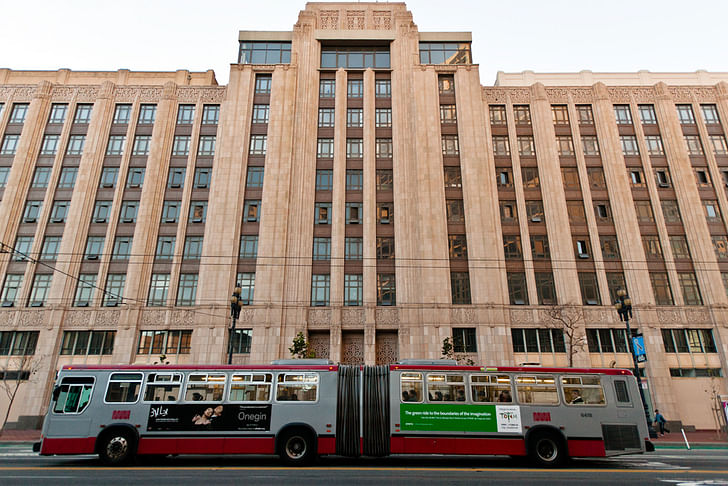
Flashpoint 4: Oakland
Moving further east, perhaps the most palpable demonstration of tension was witnessed in Oakland at the end of last year, when a bus carrying Google staff was ambushed by activists railing against the gentrification of the region. Obscenity-laden banners were unfurled, and one coach had a window broken by a particularly boisterous protestor. The animosity is driven by a perception that the web giant’s wealthy employees are forcing up rental prices by living in the area, despite working at Google’s Mountain View headquarters 60 kilometers south of the bay.
The Victors: No-one. The activists’ argument is irrevocably diluted by the use of violence in their own neighborhood: the debacle, labelled ‘domestic terrorism’ by some, does little to strengthen the cause of local people. Meanwhile, those Google buses will continue to roll.
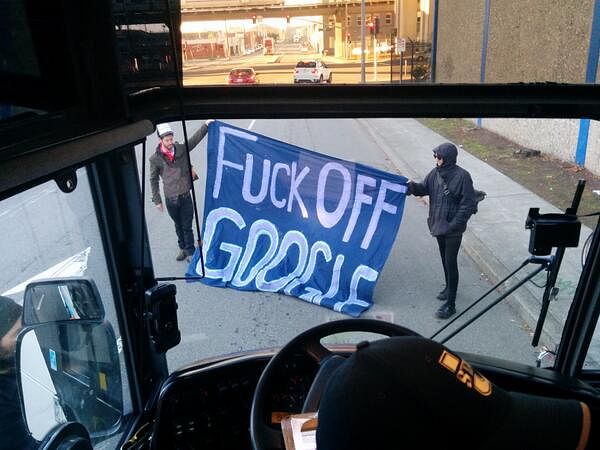
Evidence suggests that these ideological battles, being fought across the region, produce varied outcomes. In the case of Mission Playground, local people clearly came out on top, forcing a change in policy that maintains the status quo – for now. In other parts of town, ongoing gentrification spurred by the advance of tech companies and their young employees appears unstoppable: the question is, should that be viewed in a positive or negative light when it comes to the long-term prospects of the city?
Support for preceding local communities is critical, and the responsibility for this surely falls at the door of City HallFrom an outsider’s perspective, I can sympathize with both viewpoints. Tech companies should not be demonized for the economic prosperity they bring to the area, whilst their employees should not all be tarred with the same brush of disapproval: these are hardworking, talented individuals whose innovations have a wider-reaching impact on society.
However, incidents like that witnessed at the Mission Playground are symptomatic of a failure by some individuals to understand the ingrained culture of the places they are impacting upon. Support for preceding local communities is critical, and the responsibility for this surely falls at the door of City Hall: as well as tax breaks for giants like Twitter, what more can be done for small businesses and local enterprises?
While many questions such as this remain unanswered, the invasion of San Francisco will continue, with further fallouts to come. Draw your battle lines, comrades.
A graduate from University College London, having completed the Certificate in Professional Practice and Management to gain RIBA Part 3 qualification. Achieved Parts 1 and 2 at The University of Edinburgh, gaining an MArch in Architectural Design with a distinction, and was nominated for the RIAS ...
21 Comments
parallel story happening in Boston. Boston doesn't have the same sort of geographical isolation that San Francisco does, nor does it have as high prices, but there was a recent article in the Boston Globe about Area 4 in Cambridge, which is directly adjacent to the tech hub of Kendall Square - which highlights some of this change.
There are other battles - Union Square in Somerville has seen a recent surge in real estate speculation due to the green line and proximity to Cambridge and Downtown - although most people who made that place funky were priced out maybe 5-10 years ago...
The relatively recent protests over a Whole Foods moving into Jamaica Plain (neighborhood in Boston) - seemed more like a last gasp of people not willing to accept that that neighborhood has already become upscale (see recent battles over Caffe Nero, the Casey Arborway project, and an upscale petco in neighboring Roslindale - which is where people priced out of JP seem to end up). There are also battles going on in Roxbury and Dorchester... Mattapan and Hyde Park are the only areas of the city that seem to have escaped much of the gentrification battle, but we'll see what happens after the new purple line gets ramped up train service.
"From an outsider’s perspective, I can sympathize with both viewpoints."
-I really don't understand neutral positions like this and it leaves a bad taste. You sympathize with a group of predominately rich (extremely) white young males who move in to traditionally diverse neighborhoods and expect it to change to their liking?
"these are hardworking, talented individuals whose innovations have a wider-reaching impact on society"
-As opposed to social workers, nurses, teachers, scientists, etc. who are pushed out? Your assertion that tech workers aren't to blame (or should get a pass) because they are hard working and talented is not ok.
-The Mission, Mid-Market and Oakland have completely different sets of issues at completely different scales.
-A blow by blow winners and losers count is really off-base considering the realities.
This is happening in many places with an economic heart beat. The problem is there aren't enough places like this mainly because we've been tearing them down since WW2 while building wildly in the suburbs. Now that the burbs have lost their luster and all those urban renewal projects have turned into nightmare, many young folks want to live in these humane environments with character. We simply need to build more of them but as architects we're still fighting last centuy's battles about historicism and all that bull shit. In the meantime, demand will soak up supply, which is why the NYT proclaimed Queens the new Brooklyn.
You sympathize with a group of predominately rich (extremely) white young males who move in to traditionally diverse neighborhoods and expect it to change to their liking?
So, are the female, nonwhite individuals moving into these neighborhoods exempt from your classification as gentrifying villains?
Just to clarify - Tech workers moving to the Mission = predominately white males (refer to video above). Of course there are exceptions.
Are you really asking if a "female nonwhite individual" moving into the Mission is the same a a white male ivy league techy? That's what your brain chose to focus on?
Yes, there are exceptions, and you should acknowledge them.
There are plenty of Ivy-and-Stanford-educated women of color in San Francisco. People latched onto that moronic video because they like a good narrative between good (humble Chicano boys) and evil (white guys who work at Dropbox). Sure, the guys were on the Asperger's spectrum and didn't do themselves any favors with their overall demeanor. Still, the media and YouTube commenters were so quick to hate on them (there are actual calls to violence on YouTube). The guys used a new, online reservation service for the field that the City of San Francisco provided.
Your underlying argument is specious-- you're framing this as some type of cultural and/or economic imperialism, which it isn't.
The issues that the Mission is seeing has everything to do with the dearth of housing stock and commercial space on San Francisco. To foist blame onto ambitious, educated young people following opportunity (and injecting capital into the community, I might add) smacks of a tired, albeit all-too-familiar call for a race/class war.
Maybe architects should look for collective solutions rather than blaming some nebulous wrongdoer.
The rest of this really isn't worth it after reading your comments.
There was no underlying argument. There was A argument. I was clear that there are imperialistic race issues at play. It was very straight forward.
"smacks of a tired, albeit all-too-familiar call for a race/class war" Just because these issues don't affect you at all doesn't mean they don't exist. They 100% do in this context. To dismiss them for the sake of your tired disingenuous Republican argument is not ok.
"There are plenty of Ivy-and-Stanford-educated women of color in San Francisco" - Moving into the Mission? Nope - You have absolutely no idea what you are talking about.
Architects should look for a collective solutions- blah blah blah -Great - Lets collectively get on this!
You've decided that I'm a Republican and then refuse to engage. So liberal!
If culture is all you have then you aren't trying hard enough as a human being. This only applies to white males by the way, for example unemployed white trash redneck nazis, the only thing they are proud of is the culture they were born into and this is not acceptable. If you are not a white male then its ok, because after all, the white males are the reason that all you can claim is culture, something you do not earn but are born into. Talk about double standards!.........all the press is always about gentrification. What I want to know is where the poor are migrating to and what happens to those areas?
This is my first comment on Archinect, but I thought this was an interesting post and comment string, so why not.
The video in particular exemplifies the issue that agencies (in this case the City of SF) are either negligent or naive (or both) in how they administer urban/social policy. If the park was always used as first come first serve field, then suddenly making users pay, probably not going to work out well. This shortcoming constantly plagues gentrification /"neighborhood betterment" projects, as the people who are the decision makers rarely have an understanding of the community and its residents. Granted, gentrification is not intended for the current residents of a community.
In terms of vilifying the tech kids in the video, and gentrification in general. I can't do that without being hypocritical, as I am 20 something young architect who has lived in and enjoyed a variety of gentrified neighborhoods. But, the tech kids are clearly not socially well adjusted or aware which again represents the underlying lack of education problem above. I would say though that if I just moved to a City, and through the City booked park time online, booked and paid for it, then showed up and there were 20 people playing already, I would be a little confused.
The cold reality of the world is that those with money make the decisions, and if their is an economic benefit for a city to attract a powerful company to areas where real estate is at lower cost, then that's going to happen. Unfortunately what follows this powerful company is the inevitible slew of housing, restaurants, stores with little or no character that erode the fabric of the community that was there.
As has been written many times on Archinect before, I don't have an instant solution to this problem. But, I feel that as architects, urban designers, etc. we constantly have to be working to get away from the "Get out of my way, I am here to save the community" approach, and try to educate decision makers, clients, etc. that taking the time to understand neighborhoods' needs, requirements, cultures, is going to make better projects both financially (maybe) and socially (probably).
Ajb213. Good first post, keep them coming............I still want to know where do those being priced out of their neighborhoods go and what happens to those areas? Do the poor move to completely blighted and vacant area and plant a community that eventually increases property values, enough to tax for better public services which eventually may lead to gentrification? Why isn't anyone writing about this? What if the shifting of those kicked out of the neighborhood due to gentrification leads to better neighborhoods elsewhere? I have moved at least 15 times in my life, so I obviously wouldn't understand what it means to grow up in one area, hence I do not see why its a bug deal frankly to be constantly moving........Paul, in SF where do the people leaving go? Suburbs?
Olaf,
You make a great point. As one who moved in any neighborhood that had pretty historic buildings regardless of what race or socio-demographic lived there, I always thought I was embracing varied communities rather than running from them. As an American, it's my right to live where I want. Nowadays I'd be a gentrifier, but talk about a bullshit debate. People are allowed to move where they want.
As for where these people move... In my city of DC which is experiencing massive demographic shifts, the blacks are leaving to the first ring post war suburbs that the whites moved to 50 years ago when the blacks moved in with significant numbers. Those whites are moving further out or moving back in depending on their tastes in neighbors. Hispanic's are moving into poorer black neighborhoods while whites are moving in to poorer black neighborhoods that are adjacent to wealthy white neighborhoods with relatively intact historic housing stock (read humane).
But it's not as black and white and hispanic as I've just laid out in a simplistic way. There are black, hispanic and white college kids moving in, and there are black, white and hispanic families moving out. And let's not forget the immigrants of every color and nationality moving anywhere becasue they are happy to not be shot and make a living. Yes they congregate hear their supermarkets etc, but they are everywhere.
Basically, anywhere that it's convenient to walk is becoming upscale. There's simply not enough transit oriented fabric (that's historic) to go around, and what's left is post war schlock surrounded by parking lots. To be honest with you, this whole gentrification meme is another "aren't I thoughtful" posing as liberal guilt. Everybody knows that people get priced out of certain hoods and that people's circumstances or a cities circumstances change. That's not to say it isn't sad that old communities break up and die, but it's been happening since our nation's birth. As long as things are fluid, I don't get to hung up.
@olaf obviously it does vary from city to city but yes generally speaking the suburbs are where the urban poor are being displaced/moving to.
See Time Magazine from back in 2004 or the Metropolitan Policy Program at Brookings
thanks Nam. Kind of what I was guess without finding evidence, and as Thayer-D points out it's more of a "this whole gentrification meme is another "aren't I thoughtful" posing as liberal guilt"....ie the Media over simplifying a situation for whatever reasons...working this thought on the Ferguson post...
Paul, you make some great points especially in regards to the nagging but persistent homeless issue that seems to get pushed under the rug and the changing flavor of SF. When independent theaters, independent stores, and more fall to the wayside and are replaced by condos, rented out soccer fields, and tech giants we all have to wonder ... what the hell?! Stephanie Benson recently wrote a great piece about how SF has changed over 10 years I think you'd appreciate it - http://battlemountain.co/
nam - the term is poverty sprawl, and its a little more complicated than poor people moving out to the suburbs:
http://www.commonwealthmagazine.org/Voices/Conversation/2013/Summer/001-Poverty-sprawl.aspx
plus - there are some serious infrastructure problems outside the urban core (transportation, social services, community), that make it much more difficult for people who were on the borderline to regain economic footing if they happen to fall below that line.
This is part of the reason why I keep harping on transportation equity around here.
either donate a car so a guy can get a job or don't be afraid that 'dangerous' people will commute to your neighborhood when they get a public transportation line.
why are some of these people 'dangerous', because they can't get a job because they need a car and riding the bus is not what a real worker does...endless spiral...
@toast, thanks for that link. This tidbit re: changing immigration patterns was news to me "Yeah, suburbs are becoming the first stop for new immigrants to America, rather than the second or third stop after they’ve graduated from central city neighborhoods".
Also, i think the focus on need to scale up solutions, think regionally is a reoccurring theme in these matters... Love this idea of "regional quarterbacks, scaled organizations", especially if it isn't about creating new organizations or funding streams but identifying and diverting.
So it's nothing more than "liberal guilt" if I care about the welfare of people other than myself? Check.
That explains those people who don't have it, I guess. Thank you for identifying yourselves.
I can understand worrying about being unable to find affordable housing that's safe and accessible, but those who move to the neighborhood of their choice (like ma booty) need no explaining. This perenial cryfest for the oldest story in American urbanism is somewhat strange, especially from those think historic preservationists want to freeze cities in time. I find liberal guilt like this patronizing becasue it assumes one had anything to do with this. One shouldn't confuse empathy with guilt, it belittles the former.
Donna, I heard on the podcast where you declared some shame for having ancestors who owned slaves. As both the descendant of slave owners and slaves, I can assure you that you have absolutely nothing to be ashamed of. Those people don't speak for you, as much as some might wish. That dosen't mean you shouldn't care or think about the consequenses of that abhorent practice, but we are all born innocent of previous history. We are all allowed to repeat mistakes by ourselves, just as we are allowed to like any kind of architecture we like, regardless of technology. We have our birth circumstances and some genetic predispositions, but it takes the right land and sun to get that out, and even then, who know's all of nature's permutations. But I digress...
I'd care more about gentrification if I weren't still getting over little Italy's disapearance.
like in any public park just play to a certain score and then the next team takes on winner. not brain surgery there. also, cities need new blood whether that's high tech soccer dweebs or new immigrants from other lands. locals in large cities tend to be the biggest group of assbackward racists and homers that you'll ever meet.
Block this user
Are you sure you want to block this user and hide all related comments throughout the site?
Archinect
This is your first comment on Archinect. Your comment will be visible once approved.